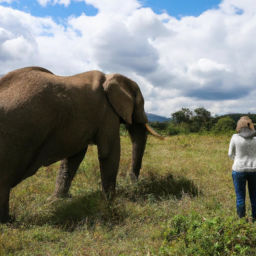Are you ready to embark on a journey that not only allows you to discover the world, but also protects it for future generations? With sustainable travel, you can make a positive impact while exploring new destinations. By choosing eco-friendly accommodations, responsible transportation options, and supporting local communities, you can minimize your environmental footprint. Learn about ethical wildlife tourism and practicing cultural sensitivity as you immerse yourself in different cultures. Together, let’s inspire others to travel responsibly and make a difference in the world.
The Importance of Sustainable Travel

The importance of sustainable travel can’t be overstated. When you embark on a journey with the intention of minimizing your impact on the environment and supporting local communities, you become part of a global movement towards a more responsible and conscientious way of exploring the world.
Community engagement is a key aspect of sustainable travel. By actively involving local communities in tourism initiatives, we can foster mutual understanding and respect. This not only enriches our own travel experiences but also promotes cultural exchange and economic empowerment for those living in the destinations we visit. Through community engagement, we can learn from each other’s traditions, values, and ways of life, fostering deeper connections that go beyond superficial tourist interactions.
Promoting conservation is another vital component of sustainable travel. As travelers, we have the power to make choices that minimize our ecological footprint and protect fragile ecosystems. By supporting eco-friendly accommodations, participating in wildlife conservation programs, or choosing eco-tours that prioritize environmental preservation, we contribute to the long-term sustainability of these natural wonders. Our actions today will determine whether future generations will be able to witness the beauty and biodiversity that our planet has to offer.
Sustainable travel is not just about reducing negative impacts; it’s about leaving a positive legacy behind. It’s about recognizing that every decision we make as travelers has far-reaching consequences – socially, economically, and environmentally. By being mindful consumers when we travel – supporting local businesses instead of large multinational corporations – we can help create a more equitable distribution of tourism revenue within communities.
Choosing Eco-Friendly Accommodations

When planning your trip, consider opting for eco-friendly accommodations. Not only will you be reducing your carbon footprint, but you’ll also be supporting businesses that prioritize sustainability. Eco friendly lodging options are becoming more popular and readily available, making it easier than ever to make a positive impact while traveling.
Here are some reasons why choosing sustainable accommodations is a great choice:
- Lower environmental impact: Eco-friendly accommodations often implement various measures to minimize their impact on the environment. They might use renewable energy sources, employ water conservation techniques, or practice waste reduction and recycling.
- Support local communities: Many sustainable accommodations focus on supporting local communities by sourcing food locally, hiring local staff members, and partnering with nearby businesses. By staying at these establishments, you can contribute directly to the economic growth of the community.
- Healthier stay: Sustainable accommodations often prioritize the use of natural materials and non-toxic products in their rooms. This means you can enjoy a healthier stay without being exposed to harmful chemicals commonly found in traditional accommodations.
- Authentic experiences: By staying at eco-friendly lodgings, you’re more likely to have an authentic travel experience. These establishments are often located in unique settings such as nature reserves or rural areas, allowing you to immerse yourself in the local culture and environment.
- Education and awareness: Many sustainable accommodations strive to educate their guests about environmental issues and promote responsible travel practices. You may have access to educational programs or workshops that can deepen your understanding of sustainability.
Responsible Transportation Options

Consider using public transportation or renting a bike to explore the destination, reducing your carbon footprint while getting around. When it comes to responsible transportation options, there are plenty of choices available that can make your travel experience more sustainable and environmentally friendly.
One of the most popular options nowadays is electric bikes, also known as e-bikes. These bikes are equipped with a small electric motor that assists you when pedaling, making it easier to climb hills or cover long distances. E-bikes are not only a fun and efficient way to get around but also produce zero emissions, making them an excellent choice for eco-conscious travelers.
Another great option is public transportation. Many cities offer extensive networks of buses, trains, trams, and subways that can take you almost anywhere you want to go. By opting for public transport instead of driving or taking taxis everywhere, you can significantly reduce the amount of carbon dioxide emitted into the atmosphere. Plus, using public transportation allows you to immerse yourself in the local culture and observe daily life from a unique perspective.
If neither e-bikes nor public transport are available or suitable for your destination, consider carpooling or ridesharing services like Uber Pool or Lyft Line. Sharing rides with other travelers going in the same direction not only helps reduce traffic congestion but also decreases the number of cars on the road and reduces harmful emissions.
Supporting Local Communities and Economies

To support local communities and economies, you can contribute to the local economy by shopping at small businesses and eating at locally-owned restaurants. By doing so, you not only help sustain the livelihoods of local entrepreneurs but also empower artisans and foster fair trade partnerships. Here are some ways in which you can make a positive impact on local communities while traveling:
Purchase handmade crafts: When you buy products directly from artisans, you are supporting their skills and traditions. Look for markets or shops that showcase locally-made crafts such as textiles, pottery, jewelry, or artwork. These purchases provide income directly to the artisans and help preserve cultural heritage.
Participate in community-based tourism: Seek out opportunities to engage with local communities by staying in homestays or guesthouses owned by locals. This allows you to experience authentic cultural exchange while contributing directly to the community’s economy.
Choose fair trade souvenirs: Many destinations have fair trade organizations that work with marginalized groups of artisans. These organizations ensure that the producers receive fair wages and work under safe conditions. Opt for souvenirs labeled as fair trade to support these initiatives.
Dine at locally-owned restaurants: Instead of eating at international chain restaurants, try dining at family-run establishments that serve traditional cuisine. Not only will you get a taste of authentic flavors, but your money will also go directly into the hands of local business owners.
Attend cultural events: Support local festivals, performances, or exhibitions as they play a crucial role in preserving traditions and generating income for artists. By attending these events, you contribute both financially and emotionally to the well-being of the community.
Minimizing Environmental Impact Through Waste Reduction

One way you can minimize your environmental impact is by recycling and composting waste. Waste management plays a crucial role in sustainable travel, as it helps reduce the amount of waste that ends up in landfills or pollutes our natural environments. By adopting practices such as recycling and composting, you can make a significant difference in preserving the planet for future generations.
When it comes to waste management during your travels, one effective approach is to embrace plastic-free travel. Plastic pollution has become a global crisis, with millions of tons of plastic ending up in our oceans each year. By reducing your consumption of single-use plastics like water bottles, straws, and bags, you can help tackle this issue and protect marine life.
To achieve plastic-free travel, consider investing in reusable alternatives. Bring a refillable water bottle that you can fill up at water stations or taps instead of buying bottled water. Carry a stainless steel straw and reusable cutlery set to avoid using disposable ones while dining out. Additionally, bring your own cloth bag for shopping instead of relying on plastic bags.
Another essential aspect of waste reduction is proper disposal. Always dispose of your trash responsibly by using designated recycling bins or composting facilities whenever available. If these options are not accessible, try to carry your waste with you until you find suitable disposal points.
Ethical Wildlife Tourism: Dos and Don’ts

When engaging in ethical wildlife tourism, it’s important to respect the natural habitats and behaviors of animals. By being mindful of animal welfare and supporting conservation efforts, you can have a positive impact on both the environment and the animals themselves. Here are some dos and don’ts to consider when participating in wildlife tourism:
Do research your destination: Before embarking on any wildlife tour or activity, take the time to research the company or organization offering the experience. Look for those that prioritize animal welfare and contribute to conservation efforts.
Don’t support activities that exploit animals: Avoid attractions that involve direct contact with wild animals, such as riding elephants or cuddling tiger cubs. These activities often involve cruel practices like captivity, abuse, or forced training.
Do observe from a safe distance: When viewing animals in their natural habitats, maintain a respectful distance to avoid causing stress or altering their behavior. Use binoculars or telephoto lenses instead of getting too close.
Don’t feed or touch wild animals: Feeding wild animals disrupts their natural feeding patterns and can lead to dependency on humans for food. Touching them can transmit diseases and disturb their social dynamics.
Do support local conservation initiatives: Choose tours that contribute directly to local communities and conservation projects. This way, your visit can help protect habitats, provide sustainable livelihoods for locals, and aid in ongoing conservation efforts.
Cultural Sensitivity and Respectful Interactions

Respecting the cultural sensitivities and ensuring respectful interactions are essential while engaging in wildlife tourism. When you embark on a wildlife adventure, it is crucial to approach different cultures with an open mind and a deep sense of cultural awareness. Building cross-cultural connections not only enriches your travel experience but also promotes sustainable and responsible tourism.
Cultural awareness is the key to fostering meaningful interactions with local communities. Take the time to educate yourself about their customs, traditions, and beliefs before visiting a destination. By understanding their way of life, you can avoid inadvertently causing offense or disrespecting their cultural norms. Remember that what may be acceptable in your culture might be considered taboo or offensive in another.
Once you arrive at your chosen wildlife destination, make an effort to engage respectfully with the local community. Embrace their customs and practices by participating in traditional activities such as dance performances or cooking classes. This not only shows respect for their culture but also allows for an authentic exchange of experiences.
Building cross-cultural connections involves going beyond superficial encounters. Take the opportunity to interact with locals on a personal level – ask questions, listen attentively, and share stories about your own background too! Engaging in meaningful conversations will help bridge any cultural gaps and foster mutual understanding.
Carbon Offsetting and Sustainable Travel Practices

To reduce your carbon footprint while exploring new destinations, consider offsetting your emissions through sustainable travel practices. By making conscious choices and adopting eco-friendly habits, you can contribute to the preservation of our planet’s natural beauty and help combat climate change. Here are some simple yet impactful ways to incorporate sustainability into your travel experience:
Choose accommodations that prioritize renewable energy: Look for hotels or resorts that utilize solar power or wind energy to reduce their carbon emissions. Staying at these establishments not only supports their commitment to environmental conservation but also inspires others to follow suit.
Opt for public transportation or eco-friendly modes of transport: Instead of renting a car or taking taxis everywhere, consider using public transportation systems such as buses, trams, or trains. Not only is this a cost-effective option, but it also reduces greenhouse gas emissions.
Support local businesses and artisans: When purchasing souvenirs or dining out, choose locally made products and eateries that focus on sustainable practices. This way, you support the local economy while promoting environmentally friendly production methods.
Engage in responsible wildlife encounters: Before engaging in any animal-related activities, research the organization’s ethical standards and ensure they prioritize animal welfare over profit. Avoid supporting venues that exploit animals for entertainment purposes.
Leave no trace behind: Practice responsible waste management by disposing of your trash properly and avoiding single-use plastics. Carry a reusable water bottle and shopping bag with you to minimize your ecological footprint.
Inspiring Others to Travel Responsibly

By sharing our experiences and tips on sustainable travel, we can inspire others to make conscious choices when exploring new destinations. Responsible tourism is not just a trend; it’s a way of life that benefits both the traveler and the environment. When you embark on eco-conscious exploration, you become part of a global movement towards preserving natural wonders and supporting local communities.
One way to inspire others to travel responsibly is by leading through example. By practicing sustainable habits such as minimizing waste, conserving water, and respecting local cultures wherever you go, you show others that small actions can make a big difference. Share your stories and photos on social media platforms, highlighting the beauty of nature and the importance of protecting it.
Another effective method is to provide practical tips for responsible tourism. Encourage people to choose accommodations that prioritize sustainability initiatives like recycling programs or using renewable energy sources. Suggest using public transportation or cycling instead of renting cars to reduce carbon emissions. Advocate for supporting local businesses that offer authentic experiences while contributing positively to the community’s economy.
Furthermore, educate others about the impact of their choices when traveling. Explain how overtourism can harm fragile ecosystems and strain resources in popular destinations. Encourage them to seek out off-the-beaten-path locations or less crowded times of year when planning their trips.
Ultimately, by inspiring others to travel responsibly, we can create a positive ripple effect in the world. Together, let’s embrace eco-conscious exploration and leave behind nothing but footprints while making lasting memories in some of our planet’s most incredible places.
Frequently Asked Questions
What Are Some Tips for Packing Sustainably When Traveling?
When it comes to packing sustainably while traveling, there are a few tips you should keep in mind. First, focus on eco-friendly packing materials like reusable bags and containers. Second, pack only what you need to minimize waste and carbon footprint. Lastly, consider buying sustainable souvenirs that support local artisans or promote conservation efforts. By making conscious choices in your packing habits, you can contribute to a more responsible and environmentally-friendly way of exploring the world.
How Can Travelers Support Local Artisans and Craftspeople While Traveling?
When traveling, it’s important to support local artisans and craftspeople to contribute to the local economy and preserve the culture. By purchasing handmade goods directly from these talented individuals, you not only get unique souvenirs but also help sustain their livelihoods. Explore markets, boutiques, or workshops where these artisans showcase their skills. Engage in conversations with them, learn about their craft, and appreciate the effort that goes into each piece. Your support can make a significant difference in preserving cultural heritage around the world.
Are There Any Resources or Websites That Can Help Me Find Eco-Friendly Accommodations?
Looking for eco-friendly accommodations? Want to travel sustainably? There are resources and websites out there that can help you find the perfect place to stay. Whether it’s a cozy eco-lodge nestled in nature or a chic hotel committed to reducing its carbon footprint, these resources can connect you with options that align with your values. By choosing eco-friendly accommodations, you can support sustainable travel and make a positive impact on the planet.
What Are Some Examples of Responsible Transportation Options in Remote or Rural Areas?
When exploring remote or rural areas, it’s important to consider sustainable transportation options. Think beyond traditional modes of travel and explore alternative methods that are kinder to the environment. From electric bikes and scooters to horseback riding or hiking, there are plenty of ways to get around without leaving a large carbon footprint. These options not only allow you to immerse yourself in nature but also contribute to the preservation of these secluded locations for future generations.
How Can I Ensure That the Wildlife Tourism Activities I Participate in Are Ethical and Responsible?
When it comes to ethical wildlife encounters and responsible animal sanctuaries, there are a few things you can do to ensure you’re making the right choices. Start by researching the organization or tour operator before participating in any wildlife tourism activities. Look for places that prioritize the well-being of animals and conservation efforts. Avoid any activities that involve direct contact with wild animals or those that exploit them for entertainment purposes. By being informed and conscious, you can contribute to responsible and ethical wildlife tourism practices.
Conclusion
In conclusion, you now have the knowledge and tools to embark on a sustainable travel journey. By choosing eco-friendly accommodations, responsible transportation options, and supporting local communities, you can make a positive impact on the world. Minimizing waste, practicing ethical wildlife tourism, and being culturally sensitive will further enhance your responsible travel experience. Don’t forget to offset your carbon footprint and inspire others to join in these sustainable practices. Together, we can discover the world responsibly and leave a lasting legacy for future generations. Happy travels!